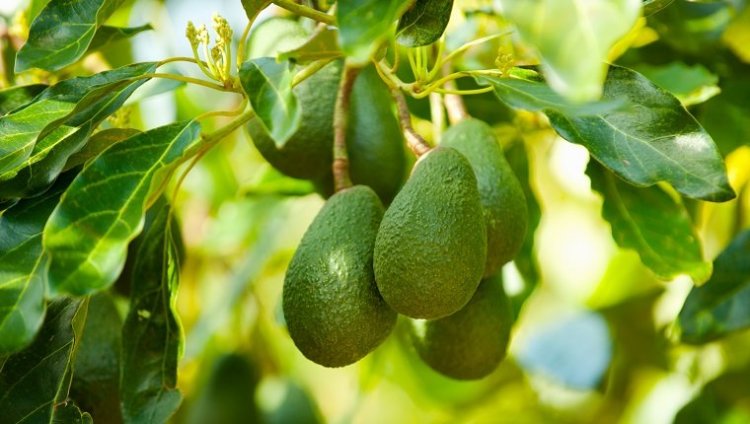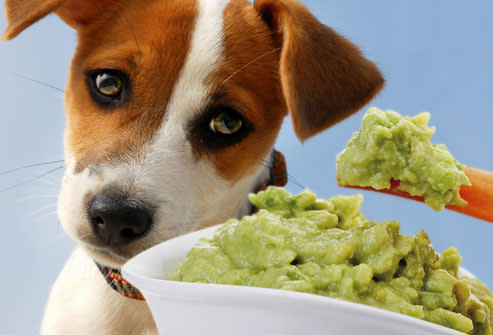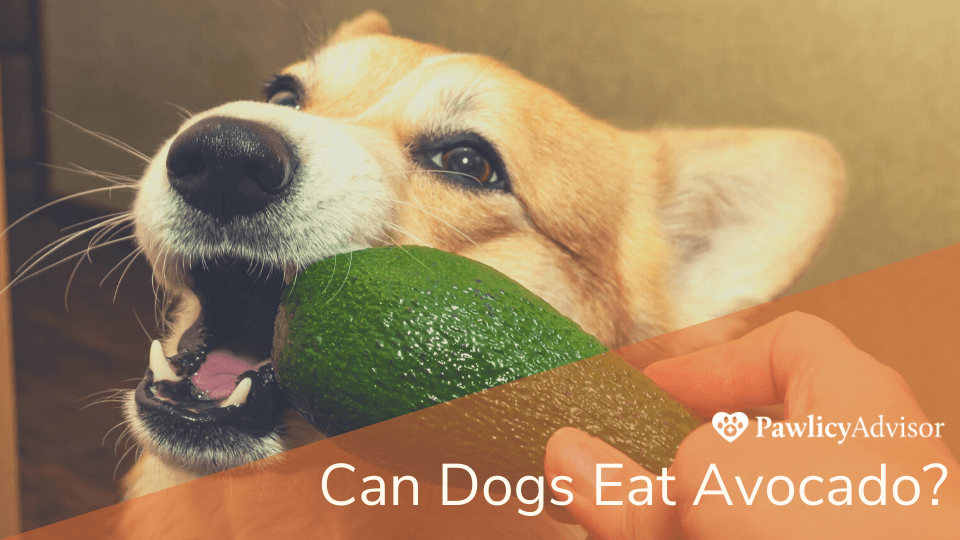Avocado is a delicious and nutritious snack for humans, but can our canine companions eat it? The answer is not so straightforward. While small quantities of avocado probably won’t harm your pup, parts of this fruit contain persin, a toxin that can cause serious health issues and even death in many animals, including dogs.
Here's a breakdown of everything you need to know about safely feeding your dog avocado.
Table of Contents:
- Is avocado safe for dogs?
- When is avocado bad for dogs?
- Can dogs eat avocado oil?
- Can dogs eat guacamole?
- Safer fruit and vegetable alternatives
- Key Takeaways
Pro tip: The right pet insurance policy can be a lifesaver in case of food poisoning. When faced with costly vet bills, pet parents who have insurance are better equipped to make decisions based on what is best for their dog rather than how it will impact their bank account.
Is avocado safe for dogs?
One of the reasons why avocados are popular is because they are rich in nutrients with known health benefits in humans. These benefits have been extrapolated to dogs. The list of nutrients found in avocados includes:
- Vitamins C, B6, B3, E, and A, which are good for skin and coat health, stronger bones, eyesight, and digestive health, among other things.
- Omega-3 and omega-6 fatty acids, which are responsible for a shiny and healthy coat.
- Niacin, folate, antioxidants, and potassium, which might help fight various diseases, including some types of cancer.
- Avocados also contain “good fat,” which may help lower cholesterol, but only if given in small amounts.
So, the bottom line is that avocado offers great nutritional value, and when certain parts of the fruit are given in small amounts, it won't harm your dog. In fact, avocados are often found on the ingredient list in certain brands of dog food. However, this doesn't mean that the fruit comes completely risk-free.

(Image source: DogTime)
When is avocado bad for dogs?
The flesh is the safest part for your dog, but it is not risk-free. Pet parents should avoid giving large amounts of avocado flesh and never feed other parts of the fruit as they can cause toxicity or pose other health risks due to their high-fat content and the size of the pit. Always consult your veterinarian before you give your pet avocados or other human foods.
High-fat content
One of the main nutritional benefits of avocados is that they contain healthy fats. However, too much fat can be dangerous for your furry pal. Dogs who consume large amounts of fat are at risk of developing pancreatitis, which can sometimes result in the need for hospitalization. Also, some dogs have medical conditions that require low-fat diets, while others might develop GI upset, diarrhea, or vomiting if they eat too much avocado.
Risk of allergies
As with other human foods, there’s a chance that your furry pal will be allergic to avocados. If you notice signs like sneezing, coughing, hives, diarrhea, gas, or itchy rashes, stop feeding your pet tomatoes and contact your veterinarian. In rare cases, an allergic reaction might lead to anaphylaxis.), a potentially life-threatening condition. Signs such as swelling, hives, and difficulty breathing can be signs of a severe allergic reaction and should prompt you to seek emergency veterinary care.
Avocado toxicity
Persin is a toxin present in the avocado pits, leaves, skin, and the actual plant, so all these parts are potentially toxic to pets. Small amounts of this toxin are also present in the fruit’s flesh. Exactly what amount of persin is lethal is not yet known but in large amounts, it can cause diarrhea, vomiting, and myocardial (heart muscle) damage.
The good news is, while this toxin can be lethal to birds, goats, cattle, and horses, dogs are more resistant to persin. Your dog would have to ingest a large number of avocados to experience toxic effects. Still, it’s better to stay on the safe side and keep your dog away from the avocado plant, as the concentrations of the toxin are higher in the stem, pits, bark, and leaves.
Avocado pit
When it comes to avocados, the greatest danger for canines is the avocado pit. The avocado pit (or avocado seed) contains persin, but even more importantly, it presents a choking hazard and potential for GI obstruction. While choking is rare in pets, it is a life-threatening emergency if the pit becomes lodged in the airway or esophagus.
Even if the golf ball-sized pit gets to the stomach without incident, it can lodge in the GI tract and cause an intestinal blockage, which requires emergency surgery to treat.
Pro tip: If your pet ingests an avocado pit, contact your vet right away. It is also a good idea to stay on the safe side with a pet insurance plan, which can cover unexpected costs. In the event something does happen, you can take comfort in knowing your dog is protected.
Can dogs eat avocado oil?
Avocado oil contains omega-3 fatty acids and vitamin E, which help reduce inflammation in the body. Because the pit, skin, stem, and leaves of avocado aren’t safe for dogs, avocado oil is a risk-free way to reap the benefits of this fruit. Avocado oil does not contain persin and is considered non-toxic to dogs.
However, just like the avocado fruit, avocado oil contains high levels of fat, so you should only feed it to your dog in small quantities and consult your veterinarian before administering it.

(Image source: Pet WebMD)
Can dogs eat guacamole?
As mentioned earlier, the avocado fruit itself is safe for your canine companion to eat in small quantities, but when it comes to guacamole, you should be more careful. While this avocado dip is delicious, it contains several ingredients that can be harmful to canines, including garlic, onions, and salt.
These foods can cause many problems, ranging from an upset stomach to serious poisoning. Garlic and onions are especially dangerous for dogs and if consumed in larger quantities, they can cause kidney failure and organ damage.
Safer fruit and vegetable alternatives
While avocados have the potential to offer some health benefits, the same benefits can be obtained from other foods that contain lower levels of fat.
If you’re looking to supplement your dog’s diet with healthy vegetable treats, you can choose from a wide variety of options, including:
- Celery
- Peas
- Green beans
- Carrots
Cabbage, brussel sprouts, and broccoli can also be fed to dogs, but only in small quantities as they can irritate their stomachs and cause gas.
When it comes to fruits, pet parents should be more careful. Most fruits contain high levels of natural sugar, which is why they should only be fed occasionally and in moderate amounts. The list of dog-safe fruits includes:
- Strawberries
- Pears
- Canteloup
- Apples
- Peaches
- Blueberries
- Pineapple
- Oranges
- Bananas
- Watermelon
Be sure to remove the skin and seeds from all fruits before offering them to your four-legged family member.
Key Takeaways
Avocados can be fed to dogs but pet parents must take certain precautions first.
-
Only give your pup the avocado flesh. Never allow them to eat the plant's bark, stem, or leaves. Be sure to remove the pit and skin to ensure that your dog won’t choke on it.
-
Keep the portion size small. Large quantities of avocado raise the risk of poisoning due to the presence of persin, and the high level of fat can also cause health issues in your dog.
-
If the members of your household like indulging in avocados, be sure that everyone is aware of the dangers of feeding avocados to your dog. If your pet tends to go through the trash, consider investing in a dog-proof trash can.
-
If you have an avocado tree in your backyard or garden, keep your pet away from that area, and clean up any leaves or branches that have fallen onto the ground.
-
When your pet is eating avocado, be sure to monitor them closely and contact your vet or the ASPCA Animal Poison Control Center with concerns.
